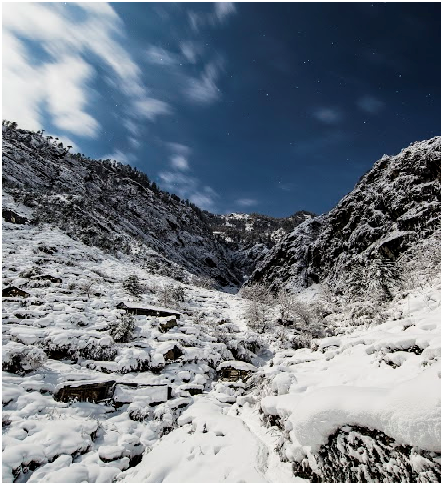The World In 2015
A photograph by Cyril Lucido Kuhn (The Citizen)

NEW DELHI: 2015 may go down as the year of the great unravelling. The year saw unprecedented violence and war. It saw armed insurgencies gain ground in host countries and the export of terror across international borders. The year was witness to attacks in Paris (twice), in Palmyra, Aleppo, Baghdad, Beirut, Kabul, Peshawar… the list goes on.
2015 gave rise to a refugee crisis of epic proportions. It was the year that the body of a dead three-year refugee boy washed ashore a Turkish beach, prompting world leaders to commit to doing more for those displaced by wars that were not of their own making. At the same time, it was also the year where after a terror attack in Paris, these same world leaders rushed to close their borders and intensify war and conflict.
The year saw natural disasters claim thousands of lives. 2015 saw the world economy hang by a thread -- all eyes on Greece, and then China. It saw the rise of Islamophobia and heightened tensions between Russia and the West.
2015 was also witness to a historic climate change treaty, where world leaders pledged to limit carbon emission and the warming of the earth’s atmosphere. It saw democracy in Myanmar, a re-election in Greece, a nuclear deal with Iran, bilateral ties between Cuba and the US, and the release of the newest film in the Star Wars franchise.
Here’s a look at 2015: the year of the great unraveling, tinged with hope for a better 2016.
The year began with a brutal attack on the offices of French satirical magazine, Charlie Hebdo, in January. Two gunmen, who identified themselves as belonging to the Islamist terrorist group Al-Qaeda's branch in Yemen, who took responsibility for the attack. They killed 11 people in the building of the Charlie Hebdo offices, with the motive being linked to the magazine’s publication of cartoons depicting the Prophet Mohammad.
In November, Paris was the scene of another violent attack, as gunmen struck near the Stade de France in Saint-Denis, followed by suicide bombings and mass shootings at cafés, restaurants, and a concert hall, killing 130 people. The Islamic State claimed responsibility for the attacks, saying they were in retaliation to French involvement in Syria and Iraq.
The world unequivocally condemned the attacks, with heads of state and governments pledging solidarity with the people of France. Many, however, drew attention to the fact that Paris was one amongst many, with such attacks having become part of daily life across Syria, Iraq, Afghanistan, Yemen, Libya, Nigeria, etc.
In fact, 2015 saw the expansion of the Islamic State outside of Syria and Iraq -- with the group claiming attacks in Saudi Arabia, Tunisia, Egypt, Yemen, Libya, Afghanistan and Pakistan.
In addition to the Islamic State, terrorist groups like Boko Haram in Nigeria, Al Shabab in Somalia, the Taliban in Afghanistan, the Tehreek-i-Taliban in Pakistan, the Al Qaeda, the al Nusra Front, etc all stepped up violence, leading to a huge surge in civilian casualties.
The US-led coalition, meanwhile, intensified its military response in Syria and Iraq, targeting symbolic Islamic State strongholds.
In Afghanistan, the US abandoned its plan to withdraw troops, as the Afghan Taliban saw some of its biggest victories since the war began in 2001, including the capture of the city of Kunduz.
In Yemen, the Saudi-led coalition (backed by the US), continued pounding Houthi rebel targets, leading to what the UN has described as a humanitarian crisis as civilians trapped in the war zone have no access to basic amenities or healthcare.
Unfortunately, there has been no attempt on the part of the big powers to revise the strategy employed in West and South Asia, with the region being trapped in a vicious cycle of ineffective governance, military response, alienation and terror.
The violence in large parts of West Asia, Africa and South Asia has led to a massive refugee crisis. In terms of numbers, 4 million refugees are from Syria alone, where the civil war and the fight against the Islamic State has forced millions to leave their homes. In September, an image of a two-year old Syrian refugee boy’s dead body washing ashore a Turkish beach went viral, prompting world leaders to commit to doing more. A few months later, however, following the Paris attacks in November, the world responded with harsher measures, with some countries closing their borders to refugees altogether.
2015 also saw destruction in a form other than war and conflict. In April, a massive earthquake killed more than 9000 people in the Himalayan country of Nepal. Hundreds of thousands of people were made homeless with entire villages flattened. Other disasters include floods (Chennai, for example), a huge fire in California, and massive typhoons.
Destruction also came in the form of the world economy, as all eyes focused in on the Greek economic crisis and a possible exit for the country from the Eurozone. The uncertainty continued in the form of Greece going in for a second election, although the storm was calmed by Alexis Tsipras’ Syriza party winning a clear mandate with 35 percent of the vote in September. A bailout package was agreed to, and world market’s breathed a major sigh of relief.
China’s economy took a major stumble as well in 2015, sending stomachs churning as China’s stockmarket endured its biggest one-day fall since 2007 on August 24.
The year, however, ended on a somewhat positive note, as the biggest news story from the last month is the historic climate change treaty arrived at in Paris. Representatives of 195 countries signed a landmark accord that will, for the first time, commit every nation to lowering harmful greenhouse gas emissions in the efforts against climate change.
Happy New Year!



